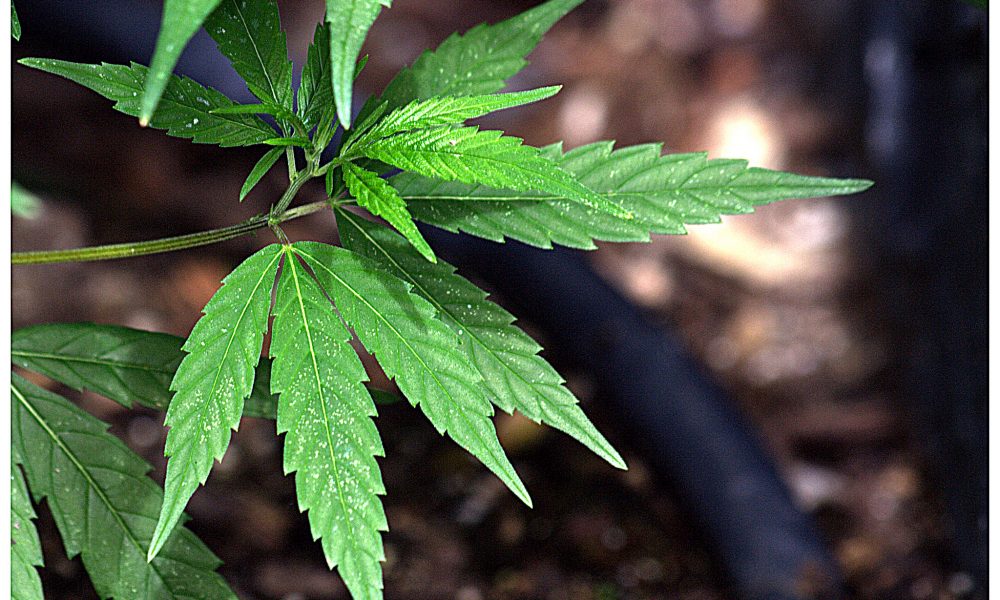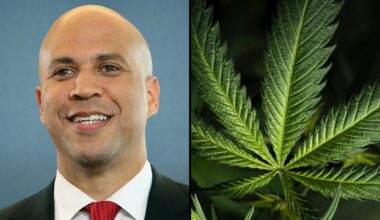The U.S. House of Representatives on Friday approved a bill to federally legalize marijuana for the second time in history, also adopting a pair of amendments to the legislation before final passage.
Following an hour of debate on the Marijuana Opportunity, Reinvestment and Expungement (MORE) Act from House Judiciary Chairman Jerrold Nadler (D-NY)—and the approval of two amendments and the rejection of a third—the full chamber voted 220-204 to end federal cannabis prohibition and promote social equity in the industry.
The vote fell largely along party lines with only three Republicans supporting the measure and two Democrats opposing it.
A nearly identical version of the MORE Act passed in 2020, but it stalled in the Senate. It passed through the sponsor’s panel again this session in September.
Nadler opened Friday’s floor debate, calling the MORE Act “long overdue legislation that would reverse decades of failed federal policies based on the criminalization of marijuana.”
It also take steps to address the heavy toll these policies have taken across the country, particularly among communities of color. For far too long, we have treated marijuana as a criminal justice problem instead of as a matter of personal choice and public health.
— Rep. Nadler (@RepJerryNadler) April 1, 2022
“It would also take steps to address the heavy toll these policies have taken across the country, particularly among communities of color,” he said. “For far too long, we have treated marijuana as a criminal justice problem, instead of as a matter of personal choice and public health.”
“Whatever one’s views are on the use of marijuana for recreational or medicinal use,” the chairman said, “the policy of arrest, prosecution and incarceration at the federal level has proven both unwise and unjust.”
House Majority Leader Steny Hoyer (D-MD) said that the MORE Act “is an important piece of legislation,” and he knows that because voters have consistently opted to legalize cannabis at the state-level at the ballot.
He also pushed back against criticism from GOP members that Democrats were ignoring critical issues like the war in Ukraine and inflation. The leader said that this bill is “what the American people tell us they think is the appropriate thing to do.”
“This bill is a matter of justice and equal opportunity,” Hoyer said. “It’s about addressing systemic inequities and reforming our criminal justice system so that Americans and America can become a better, stronger, more fair and more just America.”
The House passed two amendments and rejected one that had been made in order after the debate concluded. Here’s a description of the proposed revisions:
Rep. Josh Gottheimer (D-NJ): Provides $10 million for the National Highway Traffic Safety Administration to conduct research on “technologies and methods that law enforcement may use to determine whether a driver is impaired by marijuana.” APPROVED: 243-172
Rep. Conor Lamb (D-PA): Requires the National Institute for Occupational Safety and Health to conduct a study on the “impact of the legalization of recreational cannabis by states on the workplace” and develop “best practices for use by employers that are transitioning their policies related to the use of recreational cannabis, prioritizing the development of best practices for employers engaged in federal infrastructure projects, transportation, public safety and national security.” APPROVED: 234-189
Rep. Jamie Raskin (D-MD): Would have required federal agencies to review security clearance denials going back to 1971 and retroactively make it so cannabis could not be used “as a reason to deny or rescind a security clearance.” REJECTED: 209-214
The three Republicans to vote for overall passage of the bill were Reps. Matt Gaetz (R-FL), Brian Mast (R-FL) and Tom McClintock (R-CA). The two Democrats who voted against were Reps. Henry Cuellar (D-TX and Chris Pappas (D-NH).
Rep. Barbara Lee (D-CA), a co-chair of the Congressional Cannabis Caucus, said during the debate that “we must end this failed policy of marijuana prohibition, which has led to the shattering of so many lives, primarily black and brown people—and yes, that is extremely important.”
She also thanked leadership for advancing the legislation and advocates for educating the public on the issue. And she paid homage to the late Rep. Don Young (R-AK), a pro-legalization Republican who had served on the Cannabis Caucus and who voted for a prior version of the MORE Act.
—
Marijuana Moment is already tracking more than 1,000 cannabis, psychedelics and drug policy bills in state legislatures and Congress this year. Patreon supporters pledging at least $25/month get access to our interactive maps, charts and hearing calendar so they don’t miss any developments.![]()
Learn more about our marijuana bill tracker and become a supporter on Patreon to get access.
—
The other Democratic co-chair of the Cannabis Caucus, longtime reform champion Rep. Earl Blumenauer (D-OR), said that the MORE Act is “historic legislation, in part because we will send this to the Senate, where there is a different mindset for the leadership.”
“We’ve opened the opportunity to solve these problems,” he said. “I urge us to take advantage of it and move forward.”
Following debate and the adoption of amendments, members defeated Rep. Bob Latta’s (R-OH) motion to recommit the bill back to the Judiciary Committee with instructions to consider fentanyl scheduling legislation, by a vote of 202-220.
The chairman of the Democratic Caucus, Rep. Hakeem Jeffries (D-NY), spoke in favor of the MORE Act during debate.
“We have an over-criminalization problem in America. We have a mass incarceration problem in America. We have a prison industrial complex in America,” he said, adding that prohibition “doesn’t advance public safety and it hurts economic development.”
“It has ruined individuals ruin lives, ruined families and ruined communities, particularly in communities of color,” Jeffries said. “It’s time to end the federal cannabis prohibition.”
Rep. Steve Cohen (D-TN) said that “it’s no secret the war on drugs failed,” and cited a 50-year-old report submitted by a commission appointed by President Richard Nixon that concluded that cannabis possession should be decriminalized, only to be ignored by all subsequent administrations.
The House passed H.R. 3617 – Marijuana Opportunity Reinvestment and Expungement Act by a vote of 220-204. https://t.co/abTSLmbIxv
— House Press Gallery (@HouseDailyPress) April 1, 2022
“Congress has been out of step on this issue,” he said. “We must deschedule marijuana. We must decriminalize it at the federal level. Now it’s time to do some remedies to our federal marijuana laws. This is a historic time.”
Another member of the Judiciary Committee, Rep. Sheila Jackson Lee (D-TX), echoed the point of her Democratic colleagues, saying “the war on drugs simply failed” and “this bill is about America.”
Rep. Cliff Bentz (R-OR), who managed floor time in opposition to the reform bill, acknowledged that it has been “obvious for years that at some point marijuana was going to be formerly legalized.”
“What’s deeply and truly disturbing, however, about this bill is its failure to address the clear consequences of legalization,” he said, arguing that the policy change will negatively impact children and lead to increased traffic accidents.
Rep. Lou Correa (D-CA) stressed that 37 states have legalized cannabis in some form and “even Canada has legalized cannabis and other nations around the world are legalizing cannabis.”
Rep. Nydia Velázquez (D-NY), who chair the House Small Business Committee, said that the MORE Act is “the best proposal to ensure communities disproportionately impacted by the prohibition of cannabis are best positioned to profit from it legalization.”
Rep. Dina Titus (D-NV) reiterated what many of her colleagues said: the MORE Act “is a historic piece of legislation—no question about it.”
“With the passage of the MORE Act, the marijuana industry can become a key element of growing and diversifying our economy, creating more good jobs and putting more folks back to work as we recover from the pandemic,” she said.
Rep. David Cicilline (D-RI) said the MORE Act “takes an important step in rectifying some of the harm caused by the failed war on drugs.”
“The enforcement of marijuana laws has been a major driver of mass incarceration in the United States,” he said. “Hundreds of thousands of people are arrested each year for marijuana-related charges, very often just possession.”
“If we are serious about criminal justice, we need to get rid of the antiquated cannabis laws,” Rep. Carolyn Maloney (D-NY) said. “The MORE Act would do just that.”
Rep. Bonnie Watson Coleman (D-NJ) said that she supports the reform measure “on behalf of the countless families that have been disrupted and destroyed by our nation’s failed drug policies and the devastating war on drugs.”
Rep. Andy Biggs (R-AZ), who opposes reform despite the passage of a legalization initiative by the voters of his home state of Arizona, voiced concerns about the increased potency of cannabis products. He said the MORE Act is “reckless” because in part because it doesn’t set THC limits.
Rep. Jim Jordan (R-OH) argued that Democrats are moving the legalize marijuana at this time because they “can’t deal with the real problems facing the American people” such as “the inflation problem, the energy problem, the illegal immigration problem on our southern border.”
In his closing remarks, Nadler said that “federal laws have not kept pace with the obvious need for change” and urged his colleagues to support the legislation.
Here are details about the key provisions of the MORE Act:
Nadler’s MORE Act would deschedule marijuana by removing it from the list of federally banned drugs under the Controlled Substances Act (CSA). However, it would not require states to legalize cannabis and would maintain a level of regulatory discretion up to states.
Marijuana products would be subject to a federal excise tax, starting at five percent for the first two years after enactment and rising to eight percent by the fifth year of implementation.
Nobody could be denied federal public benefits based solely on the use or possession of marijuana or past juvenile conviction for a cannabis offense. Federal agencies couldn’t use “past or present cannabis or marijuana use as criteria for granting, denying, or rescinding a security clearance.”
People could not be penalized under federal immigration laws for any cannabis related activity or conviction, whether it occurred before or after the enactment of the legalization legislation.
The bill creates a process for expungements of non-violent federal marijuana convictions.
Tax revenue from cannabis sales would be placed in a new “Opportunity Trust Fund.” Half of those tax dollars would support a “Community Reinvestment Grant Program” under the Justice Department, 10 percent would support substance misuse treatment programs, 40 percent would go to the federal Small Business Administration (SBA) to support implementation and a newly created equitable licensing grant program.
The Community Reinvestment Grant Program would “fund eligible non-profit community organizations to provide a variety of services for individuals adversely impacted by the War on Drugs…to include job training, reentry services, legal aid for civil and criminal cases (including for expungement of cannabis convictions), among others.”
The program would further support funding for substance misuse treatment for people from communities disproportionately impacted by drug criminalization. Those funds would be available for programs offering services to people with substance misuse disorders for any drug, not just cannabis.
While the bill wouldn’t force states to adopt legalization, it would create incentives to promote equity. For example, SBA would facilitate a program to providing licensing grants to states and localities that have moved to expunge records for people with prior marijuana convictions or “taken steps to eliminate violations or other penalties for persons still under State or local criminal supervision for a cannabis-related offense or violation for conduct now lawful under State or local law.”
The bill’s proposed Cannabis Restorative Opportunity Program would provide funds “for loans to assist small business concerns that are owned and controlled by individuals adversely impacted by the War on Drugs in eligible States and localities.”
The comptroller general, in consultation with the head of the U.S. Department of Health and Human Services (HHS), would be required to carry out a study on the demographics of people who have faced federal marijuana convictions, “including information about the age, race, ethnicity, sex, and gender identity.”
The departments of treasury, justice and the SBA would need to “issue or amend any rules, standard operating procedures, and other legal or policy guidance necessary to carry out implementation of the MORE Act” within one year of its enactment.
Marijuana producers and importers would also need to obtain a federal permit. And they would be subject to a $1,000 per year federal tax as well for each premise they operate.
The bill would impose certain packaging and labeling requirements.
It also prescribes penalties for unlawful conduct such as illegal, unlicensed production or importation of cannabis products.
The Treasury secretary would be required to carry out a study “on the characteristics of the cannabis industry, with recommendations to improve the regulation of the industry and related taxes.”
The Bureau of Labor Statistics (BLS) would be required to “regularly compile, maintain, and make public data on the demographics” of marijuana business owners and workers.
Workers in “safety sensitive” positions, such as those regulated by the Department of Transportation, could continue to be drug tested for THC and face penalties for unauthorized use. Federal workers would also continue to be subject to existing drug testing policies.
References to “marijuana” or “marihuana” under federal statute would be changed to “cannabis.” It’s unclear if that would also apply to the title of the bill itself.
Prior to the adoption of amendments on the floor on Friday, lawmakers had already made one change to the text of the MORE Act, which some advocates are cheering, as it seemingly would give additional leeway to businesses that would be required to get a federal permit to operate a marijuana business.
While the earlier version said a permit could be rejected if a prospective business’s premises “are not adequate to protect the revenue” generated from legalization, the new language says the rejection can be made if officials determine the premises “will not be adequate.
On Thursday, the House held a floor debate on the rule for considering the legalization bill, prior to which Speaker Nancy Pelosi (D) said she is “all for” the measure, stressing that “many states have already” enacted the policy change and so “this is consistent with is happening in many states across the country.”
After House leadership confirmed the chamber would again be voting on the MORE Act, the majority and minority leaders of the Judiciary Committee released a nearly 500-page report on what the legislation would accomplish and outlining arguments for and against the reform.
Also, following a Rules Committee vote on the legislation on Wednesday, the Congressional Budget Office (CBO) released a report finding that enacting the MORE Act would add billions in revenues and reduce prison costs over the next decade.
The move to hold another vote on the cannabis legalization bill comes weeks after congressional Democrats held a closed-to-press session at a party retreat that included a panel that largely centered on the reform legislation.
A pro-legalization GOP congressman who serves as co-chair of the Congressional Cannabis Caucus, Rep. Dave Joyce (R), authored a Marijuana Moment op-ed explaining why he feels he cannot support the bill. His office had earlier circulated a letter to other Republican offices this week offering resources on navigating cannabis policy issues but expressing opposition to the MORE Act as drafted.
Joyce separately sent a letter to Nadler last month, expressing his willingness to work with the bill sponsor on revisions to build bipartisan support.
While I am proud to be the sponsor of this legislation, there are many people who are responsible for getting us to this point today, and I want to thank them for their efforts, and I encourage my colleagues to support this critical legislation. https://t.co/xZ1b84DnKX
— Rep. Nadler (@RepJerryNadler) April 1, 2022
Meanwhile, advocates and stakeholders are eagerly awaiting the formal introduction of a separate Senate legalization bill that’s being finalized by Majority Leader Chuck Schumer (D-NY) and colleagues. Schumer recently said the plan is to file that bill—the Cannabis Administration & Opportunity Act (CAOA)—in April.
Also in Congress, a separate bill to tax and regulate marijuana is also in play this session. Rep. Nancy Mace (R-SC) is sponsoring that legislation, and she said in a recent interview that she’s received assurances from Democratic leaders that her States Reform Act will receive a hearing following the MORE Act floor vote.
Meanwhile, on the same day that it was announced that the MORE Act would be heading to the floor again, the Senate unanimously approved a bipartisan bill meant to promote research into marijuana, in part by streamlining the application process for researchers who want to study the plant and to encourage the Food and Drug Administration (FDA) to develop cannabis-derived medicines.
Congressional researchers separately released a report recently that details the challenges posed by ongoing federal prohibition and the options that lawmakers have available to address them.
Image element courtesy of Tim Evanson.
Medical Disclaimer:
The information provided in these blog posts is intended for general informational and educational purposes only. It is not a substitute for professional medical advice, diagnosis, or treatment. Always seek the advice of your physician or other qualified healthcare provider with any questions you may have regarding a medical condition. The use of any information provided in these blog posts is solely at your own risk. The authors and the website do not recommend or endorse any specific products, treatments, or procedures mentioned. Reliance on any information in these blog posts is solely at your own discretion.







